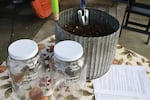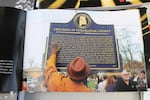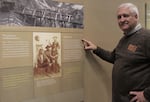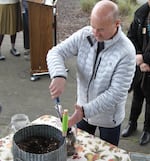Editor's note: This story contains graphic descriptions of violence.
Several hundred people gathered in Coos Bay last weekend to remember Alonzo Tucker, the victim of the only documented lynching in Oregon's history.
Participants put soil from the spots where Tucker was grabbed, shot and lynched into two glass jars, to be displayed in the Coos History Museum and at the National Memorial for Peace and Justice in Alabama.

Retired teacher Steven Greif collected soil from spots where Alonzo Tucker was captured, shot and lynched, so it could be put in jars for display at Coos History Museum and the National Memorial for Peace and Justice in Alabama.
Kristian Foden-Vencil / OPB
The ceremony was held in a small park, sandwiched between the site of the old Coos Bay City Hall and a busy highway. Attendants were somber as they heard how Alonzo Tucker was hanged from a nearby bridge in front of a crowd of 300 people in in 1902.
Portland State University student Taylor Stewart organized the event after traveling on a kind of civil rights pilgrimage through the southern United States.
“I’ve had people ask me, why do this? Why bring up the past like this?" Stewart told the crowd. "To that I say there is an injury in Oregon’s relationship to Black Oregonians. An injury that we have not yet addressed or begun to heal.”
A group called the Equal Justice Initiative is gathering jars of soil from underneath 4,400 lynchings that happened in the U.S. between Reconstruction and World War II.

PSU student Taylor Stewart organized the remembrance ceremony for Alonzo Tucker after he took a civil rights pilgrimage through the South.
Kristian Foden-Vencil / OPB
After the event, Coos Bay retiree Jackie Matthews said it was good to shed light on misdeeds of the past.
“It’s the beginning of reconciliation when we can talk about it and show what it was and show our determination to go into the future with those things not happening,” Matthews said.
Since Alonzo Tucker never had a trial, there is no official record of what happened. But The Coquille City Herald reported that Mrs. Ben Dennis of Libby, a woman it said was “above reproach,” was dragged into some bushes and assaulted by Tucker.
He was a boxer and owned a small gym in town.
Newspapers of the day described the story. “When his beastly desires were gratified,” one reporter wrote, “he turned his prey loose, at the same time threatening to kill her if she ever divulged the proceedings.”
Tucker was arrested that evening without struggle and was placed in jail.
But as the allegation spread among local miners, an angry crowd gathered and made for the jail. A marshal tried to ship Tucker away in a boat for protection. But Tucker ran.
Taylor Stewart said the town searched all night, but it was two children who found him under a store the next morning.
“This wasn't just a few vigilantes. It was a whole community participating in this," Stewart said. "After Alonzo was found, he fled, at which point he was shot in the leg and upper body. The town people threw him in the back of a truck and put a noose around his neck. And the plan was to lynch him from the spot of the alleged assault.”
This all happened in broad daylight, with nobody hiding their identities.
As a young, Black man, Stewart said, Tucker’s fate resonates, “When you go to places like Germany, they tell you about the Holocaust. When you go to Rwanda, they tell you about genocide. When you go to South Africa, they tell you about apartheid. But when you come to the United States, we don't tell you about these difficult parts of our history."

Taylor Stewart had hoped to put a large historical sign up about the Alonzo Tucker lynching, like others around the nation. The city is paying for a smaller plaque, closer to the ground.
Kristian Foden-Vencil / OPB
He said it's especially true of Oregon. "We don't talk about black exclusionary laws," Stewart said. "We don't talk about the fact that we had the largest Ku Klux Klan organization west of Mississippi.”
After being shot, Tucker’s wounds were so severe he died en route to the lynching. But the crowd hanged him from a beam on the South Marshfield Bridge anyway.
An inquest found he’d died from a wound inflicted by parties unknown and that no crime had been committed.
The Coquille City Herald wrote that while many citizens do not favor lynch law, in this case the job was “well done.” Stewart said many newspapers were sympathetic to the lynch mob.
"While there was remorse shown, it had more to do so with the fact that the event occurred just like what happened in the South," Stewart said. "There wasn't much consideration made to the injustice or the fact that Alonzo died. It had more to do with: 'Well, now we have the same reputation as the South.'”

Retired teacher and Coos History Museum board member Steven Greif shows the Alonzo Tucker display. He says the museum plans to do more on civil rights in the future.
Kristian Foden-Vencil / OPB
It’s a sorry tale that is already documented in the nearby Coos History Museum. Retired teacher Steven Greif said that for years he told Tucker’s story to his high school history students.
“What’s different now is that … we can do more to educate people, not only about Alonzo Tucker, but about other injustices," Greif said. "The Catholics here suffered in the 1920 with Ku Klux Klan activity. The Chinese that built the railroads here had issues. And certainly the Native Americans, who were forced to be on a reservation. So the museum plans on doing more than just a simple thing that we’re looking at right here.”
The renewed focus on the lynching has been difficult for some in the community.
Despite emails and calls, restaurateur and Mayor Joe Benetti did not want to talk to OPB. Instead, the City Council issued a statement acknowledging the racial injustice perpetrated against Indigenous peoples, immigrants and Alonzo Tucker.

Coos Bay Mayor Joe Benetti puts soil from where the lynching of Alonzo Tucker took place in 1902 into a jar for display.
Kristian Foden-Vencil / OPB
Stewart has asked the town to put up a large, eye-level historical marker, like ones being placed elsewhere around the country. But the city has only given permission for a plaque, lower to the ground.
“The city did that in order not to add insult to injury to the others in this community," said City Manager Rodger Craddock, who is also the former police chief.
“Here we have one incident involving Alonzo Tucker, but many incidents for many of our other past ancestors.”
Craddock said the city had offered to pay for the plaque.
After the ceremony, hundreds of people, including Benetti, lined up to put soil into jars marked for Alonzo Tucker.
